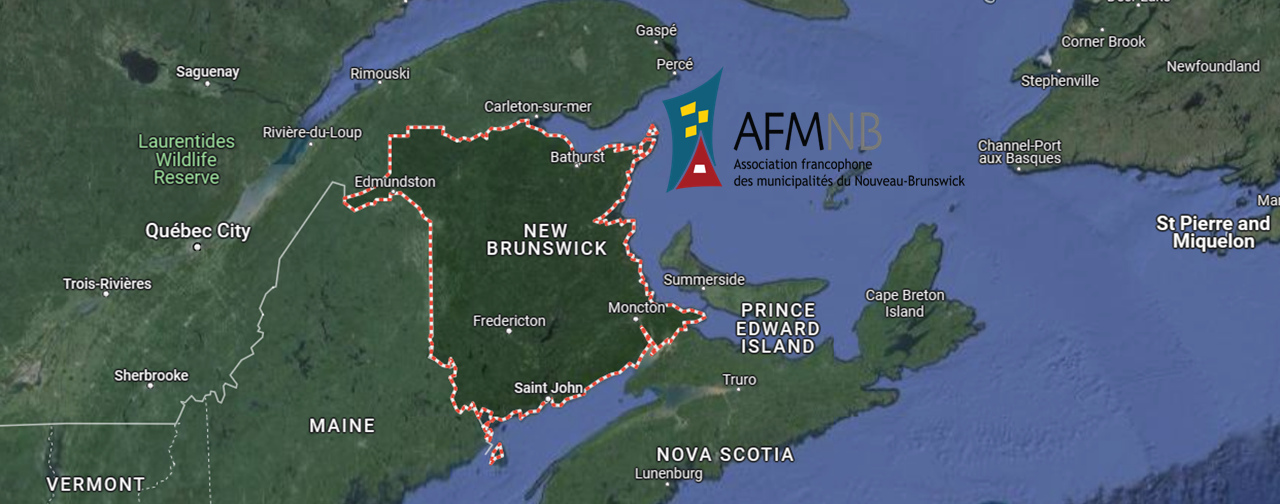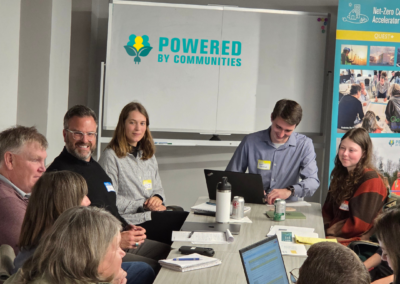L’Association francophone des municipalités du Nouveau-Brunswick – Working to accelerate climate action to a wider audience
For most people who work in sustainability and climate action, it’s all about impact; how can you make the biggest positive difference in the people and communities around you? Clément Mousset is no different – but he has the advantage of being in the enviable position of influencing more people, communities, and leaders, than most.
Mousset is Sustainable Development Coordinator for the Association francophone des municipalités du Nouveau-Brunswick, an organization of about 30 francophone and bilingual communities across Canada’s only officially bilingual province. AFMNB’s member communities comprise nearly half of NB’s population, so the association has the ability to reach and impact a large number of people.
And having sustainability as his exclusive responsibility gives Mousset the opportunity to focus on climate-related issues to a greater depth than most municipalities can manage with their limited resources.
“Most of our programs and activities revolve around helping municipalities and their residents improve efficiency, reduce emissions and adapt to climate change,” says Mousset.
Helping promote the uptake and use of electric vehicles was an early priority. A 2018 project saw five member municipalities – Beresford, Dieppe, St. Quentin, Shippagan and Tracadie – take part in a pilot project aimed at electrifying their municipal fleets.
“Each community bought at least one EV for their own use,” Mousset shares. “They’ve all been happy with the performance – and the savings.” Concurrently, the AFMNB has supported electrification of transportation by offering seminars and webinars to dispel common myths and explain the economic and environmental benefits of EVs.
The project was to have included car sharing, where municipally-owned EVs were to be made available for residents to use – potentially even for free – on evenings and weekends. Unfortunately, that element of the project had to be cancelled due to the pandemic. However, Mousset is hopeful that that opportunity may be revisited in the future, noting how much more likely people are to purchase EVs if they have a chance to try them out first.
Since lack of charging infrastructure is a significant barrier to the more rapid uptake of electric vehicles, expanding the network of EV chargers is also a priority for AFMNB. The Association is working on a proposal that would see the installation of chargers in six member municipalities. If funding is received, it’s hoped that at least 10 new chargers – both Level 2 and Level 3 (DC fast chargers) – will be installed by early 2025.
One of the most exciting priorities currently on Mousset’s list is examining the feasibility of municipalities being able to offer programs to help residents and business owners finance energy efficiency upgrades.
“In some provinces, it’s not uncommon for municipalities to offer such programs,” Mousset explains. “So, if that can work elsewhere, why not here too?” The AFMNB is working with seven member communities to examine ways municipalities might finance, for example, the installation of heat pumps, solar panels, or other energy-saving technology.
Of particular interest is an approach called Property Assessed Clean Energy, or PACE. Under a typical PACE program, a resident can receive a low-interest loan from their municipality that enables them to make specific upgrades to their properties. The municipality’s investment is protected because the loan is secured by the property, and residents repay the loan over time in accordance with an agreed-upon payment schedule.
“The beautiful thing about well-designed PACE programs is that the energy savings generated are often more than enough to cover the loan payment,” smiles Mousset. “So it’s a win-win-win: for the municipality, the resident and the environment.”

The AFMNB is working with a consultant who specializes in PACE and other potential options. A report is expected this year, and it’s hoped that the first programs could roll out in 2025.
Mousset also understands the growing importance of adding climate risk as a key consideration in municipal asset management. He and his colleague Marcel Vienneau, AFMNB’s Asset Management Coordinator, are preparing to launch a four-year collaborative project that integrates those two priorities.
“Geoportail is an online platform for mapping physical assets, and then developing asset management plans,” he explains. “We’re planning to add a ‘climate layer’, an overlay that defines climate risks and vulnerabilities for all those assets.”
The end goal of the project is to provide municipalities with a tool that enables them to understand climate threats and factor them into their long-term asset management plans.
“Flooding and erosion are risks of particular concern,” he notes from his office within sight of Baie des Chaleurs. “Many of our member communities have experienced heavy rain events and powerful storm surges in recent years, so we’ll probably need to put more focus on climate adaptation in the future too.”
Mousset and the AFMNB are also working with QUEST to shepherd six member municipalities through the first steps of creating their Community Energy and Emissions Plans, or CEEPs. NB’s most recent Climate Change Action Plan requires that all municipalities have a CEEP in place by 2030. That’s a big challenge, in particular for smaller communities with few staff.
“We’re first helping them inventory their energy and emissions, which can be a daunting process,” he says. “Then we’ll help them develop a plan of actions and priorities.”
The AFMNB-QUEST Canada partnership was initiated in 2022 and is expected to be renewed in 2024.
And what does Mousset see as the biggest challenges going forward?
“Engaging people is an ongoing process,” he admits. “Our biggest successes come when we appeal to their self-interests.” For citizens, that might mean appealing to protecting property and saving money. For leaders, that might mean helping identify and access funding sources, or offering guidance and services that could lighten staff workloads. “Of course, high profile events like windstorms and storm surges have definitely made it easier to get people’s attention.”
Funding is an ongoing concern, but many climate action programs have proven very helpful – notably, NB’s Environmental Trust Fund and the Green Municipal Fund, administered by the Federation of Canadian Municipalities and funded by the federal government.
As an association of municipalities, AFMNB occupies a unique position at the crossroads of local and provincial regulations and interests. It’s a role that can be challenging, but it also offers continuous opportunities for creative collaboration and consensus-building. Mousset sees the trend toward improved intergovernmental relationships, especially in the realm of climate action, as a positive development.
“We’re doing our best to work together and bring climate solutions to as many people as possible, as quickly as possible.”
ABOUT THE AUTHOR

Carl Duivenvoorden

About Powered by Communities
Established in 2017, Powered by Communities is an awareness-raising, communications and media platform that highlights and celebrates local community energy initiatives taking place across the country, from coast to coast to coast. The platform inspires, informs and engages its readership with stories and articles detailing community energy initiatives being led by local governments, municipalities, Indigenous communities, community groups, non-profits, charities, and enterprising individuals.

About QUEST Canada
QUEST Canada is a registered Canadian charity that supports communities in Canada on their pathway to net-zero. Since 2007, we’ve been facilitating connections, empowering community champions and advising decision-makers to implement efficient and integrated energy systems that best meet community needs and maximize local opportunities. We develop tools and resources, convene stakeholders and rights holders, and advise decision-makers — all with the goal of encouraging, assisting and enabling communities to contribute to Canada’s net-zero goals.

Support local communities by sharing this story
MORE FROM POWERED BY COMMUNITIES
Sign Up
Join the Conversation!
Sign up to get the latest news and updates about QUEST Canada events and receive QUEST Canada's monthly newsletter.




